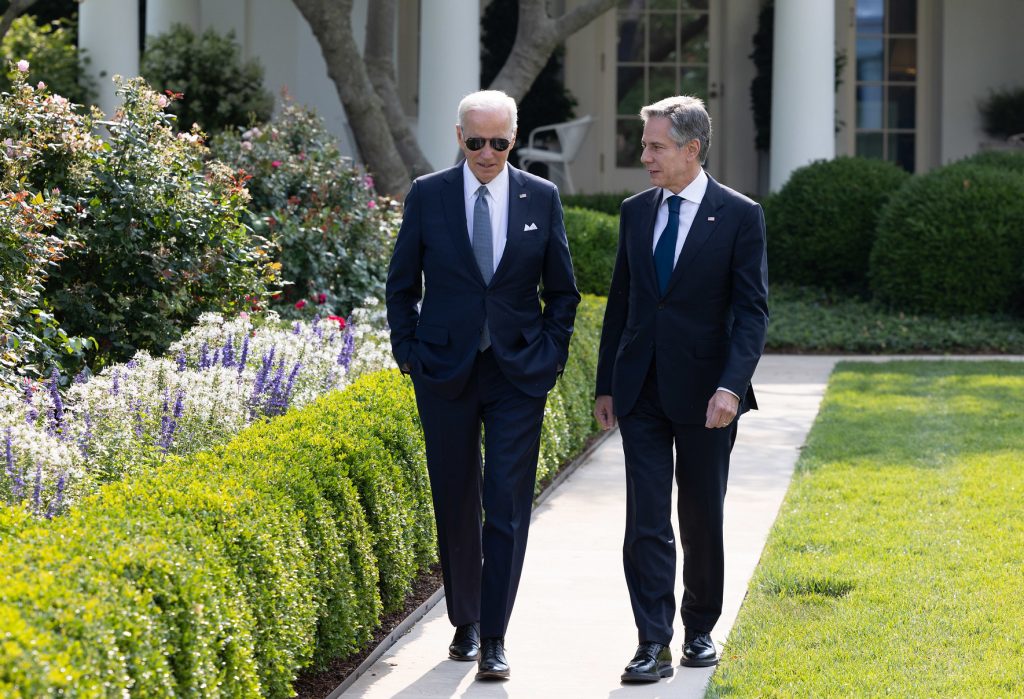Australia/Israel Review
A Deal that Must Not be Named?
Jun 28, 2023 | Lahav Harkov

In the Harry Potter books, characters call the villain “He Who Must Not Be Named,” for fear that saying “Voldemort” will conjure up the evil villain.
The Biden Administration won’t say “Iran Deal” – apparently because it fears Congress. It is negotiating “the deal that must not be named.”
Israeli PM Binyamin Netanyahu and Defence Committee Chairman Yuli Edelstein have called it a “small agreement”, a “mini-deal” and a “memorandum of understanding”, but the State Department is doing the rhetorical equivalent of whistling and saying, “nothing to see here.”
Why is the Biden Administration not saying, “Iran Deal”?
The reason for this is the 2015 Iran Nuclear Agreement Review Act (INARA), which requires the US president to bring any agreement relating to Teheran’s nuclear program to Congress for a 30-day review period.
Legally, the president may enter into an executive agreement without approval from Congress, so in that sense, INARA-based congressional review can’t stop President Joe Biden from doing what he wants.
A lesser-known element of INARA is what former State Department adviser on Iran, Gabriel Noronha, has called “legislative snapback”. The law states that “if the President does not submit such 90-day compliance certification” – that Iran is in compliance with the JCPOA (Joint Comprehensive Plan of Action) – “or has determined that Iran has materially breached an agreement and not cured it, legislation reinstating statutory sanctions against Iran introduced within 60 calendar days of such event shall be entitled to expedited consideration.”
In other words, if Iran is violating the JCPOA – which it has been, for years – then Congress can fast-track a bill to reinstate sanctions.
There is a question of whether that is relevant after the US left the JCPOA in 2018, but there’s a fair chance someone in Congress will test it.
At a recent J Street event, former Obama Administration lawyer Tess Bridgeman, who worked on JCPOA, essentially called to keep the details of the new Iran agreement secret.
“With elections coming up, we are not going to see the Administration do anything that requires voting in Congress, so I think it’s really important to keep in mind… that [agreements] be in that realm of discretionary, unilateral gestures,” she said. “Something that’s written down on a piece of paper for all sides to try to implement is a recipe for Congress making it impossible.”
The Biden Administration, many of whom are Obama alumni, clearly understands that INARA is a political landmine, because of the weaknesses of the “not-a-deal” that they are concluding.
Secretary of State Antony Blinken started to talk about the need to put Iran “back in the box” of the 2015 JCPOA, soon after Biden was elected president. This unnamed agreement seems to be their way of doing that – except that if the JCPOA put Iran in a box, the new understandings are a shipping container.
Back in 2012, Iran had enriched large quantities of uranium to 20%, and a small quantity to 27%, according to the International Atomic Energy Agency. That was enough to rouse Netanyahu to display a cartoon bomb at the UN and urge the world to take action. The subsequent JCPOA limited Iranian uranium enrichment to 3.67% purity.
Today, Iran is enriching uranium to 60%, plus a small quantity reached 84%. (Weapons-grade uranium is enriched to 90% purity.) The “not-deal” would limit Iran to continuing to enrich to 60% – that’s a lot more than 3.67%.
It’s almost enough to make one nostalgic for the JCPOA, which had the inherent downside of recognising an Iranian “right to enrich”.
Other weaknesses of the JCPOA that the “not-agreement” repeats are the sanctions relief – money that props up the mullahs’ regime and can be used to terrorise the Middle East – and lack of significant restrictions on Iran’s ballistic missiles program and proxies in the region.
Yes, the new understandings reportedly stop Iran from selling missiles to Russia or having its proxies kill Americans in Syria, according to the New York Times. Even those narrow limitations seem unlikely to be effective. Iran’s post-sanctions “resistance economy” relies on Russia and China, such that alienating the former would be a bad idea from Teheran’s perspective. Plus, Iran does not generally admit to being behind its proxies when they attack Americans, so why would they change now?
Meanwhile, members of both parties and both houses of Congress are not accepting the Biden Administration’s attempts to circumvent them and are questioning the wisdom of a deal with Iran at this time.
House Foreign Affairs Committee Chairman Michael McCaul, a Republican, wrote to Biden: “Rather than using United States diplomatic leverage and military deterrence to dissuade Iran from engaging in these malign activities, this administration is rewarding Iran’s bad behaviour in exchange for a false promise of de-escalation.
“I urge the administration to remember that US law requires that any agreement, arrangement, or understanding with Iran needs to be submitted to Congress pursuant to INARA. Any continued obstruction will rob the American people… of answers about why the United States is facilitating the lining of Iran’s coffers.”
Republican Senator Lindsey Graham said of the Biden Administration’s talks with Iran, to Jewish Insider: “They want a deal so bad they can taste it. They’ll crawl through glass for it. It’s unseemly.”
Graham and two Democratic senators, Richard Blumenthal and Robert Menendez, proposed a bill requiring the Administration to notify Congress within two days if Iran enriches uranium past 60%.
Tim Kaine, a Democratic senator who voted in favour of the JCPOA in 2015, told Jewish Insider: “I think you would find even those of us who were supporting the JCPOA, we’re so sceptical of Iran right now that you wouldn’t just get people up here who – because they supported in the past – are just going to be [supportive]… [Iran’s] misbehaviour in the region, but in particular against its own people, has led to intense scepticism.”
INARA was passed in 2015 to force the Obama Administration to admit the details of the deal it was reaching to Congress. That agreement was unpopular once the American people knew what was in it. It’s hard to see how this will be any different, unless the Biden Administration does get away with hiding it as a “deal that must not be named.”
Lahav Harkov is the Senior Contributing Editor and Diplomatic Correspondent of the Jerusalem Post. © Jerusalem Post (www.jpost.com), reprinted by permission, all rights reserved.
Tags: Iran, United States, nuclear






